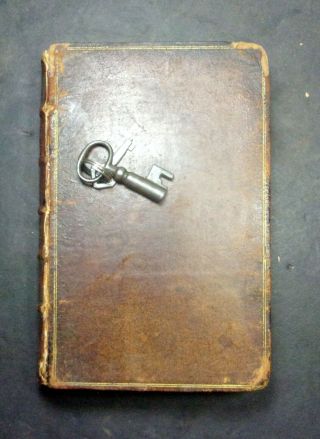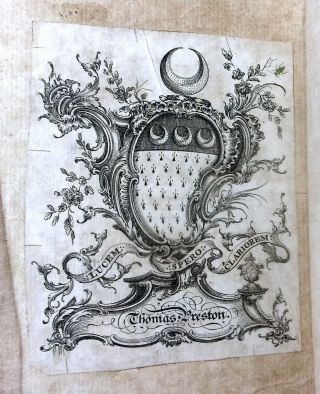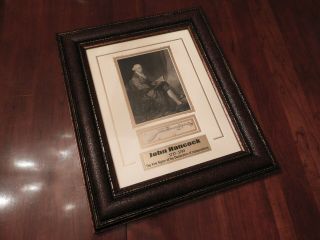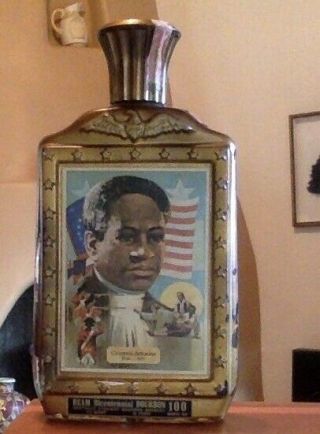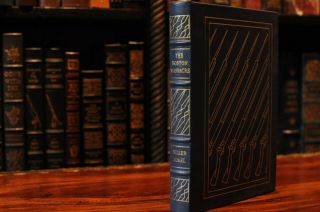1753 IMP. BOSTON MASSACRE PROV. ? Pope HORACE 336p (FINE) Engr. Plates LEATHER
Item History & Price
Armorial bookplate of "Thomas Preston, " along with a heraldic shield and the motto “Lucem Spero Clariorem.” The British army captain who was put on trial after the Boston Massacre was named Thomas Preston. See discussion below. Alexander Pope (1688-1744) was one of the most prolific writers in the early eighteenth-century. In addition to several major poems--Essay on Man, Essay on Criticism, The Rape of the Lock, The Du...nciad, Windsor Forest--Pope translated Homer's Iliad and Odyssey into English. He is considered among the greatest satirists in English literature, and his two great satires, The Rape of the Lock and The Dunciad, are considered the best in the eighteenth century and illustrate his skills admirably. 1753.Attractive in full polished gilded calf. Thick: 340pp. All edges marbled. 8vo. 7 1/2" tall. Printed in English... and published in London.Provenance... Armorial bookplate of "Thomas Preston, " along with a heraldic shield and the motto “Lucem Spero Clariorem” to front pastedown. It as yet unconfirmed to whom this belonged, but research seemingly suggests it likely either Thomas Preston (c.1722—c. 1798), British officer, the famed captain who served in Boston in the Province of Massachusetts Bay and commanded troops in the Boston Massacre in 1770 and was tried for murder, but he was acquitted... or Sir Thomas Hulton Preston, 1st Baronet (1767–1823).
Captain Thomas Preston was the key figure in the fatal incident known as the Boston Massacre and the subsequent trials. In fact Preston’s name is one of the most mentioned in the historic texts, second perhaps only to Crispus Attucks who became a well known American hero. He was a captain who served in Boston in the Province of Massachusetts Bay. He commanded troops in the Boston Massacre in 1770 and was tried for murder, but he was acquitted. Historians have never settled whether he ordered his men to fire on the colonists.
Sir Thomas Hulton Preston, 1st Baronet (1767–1823). His father was Henry Hulton, an American Loyalist living in Boston in the mid-1770s. Hulton was a British official sent to America in 1767 as head of the commissioners to enforce the Stamp Act. Hulton and his family left Boston in March of 1776 and went to Quebec, then to England. He died in 1791 at the age of 59.
Interesting, if still unconfirmed provenance. Of note, one 2006 research thread found, by J.R. Bell (author of The Road to Concord: How Four Stolen Cannon Ignited the Revolutionary War (Journal of the American Revolution Books) traces a slightly different Thomas Preston bookplate (albeit the same motto) bookplate that appears on a Hulton (Henry Hulton, one of the Commissioners of Customs stationed in Boston from 1767 to 1776) manuscript in the Princeton University library, and concludes while that one (a different but somewhat similar bookplate) might be the Boston Massacre army captain, it was more likely that 1st Baronet Preston (or his relative).
In older style English, w/F for S, etc.Pope's works (contents as shown). His Satires, Etc.Presents nicely. 1753. Scarce. Full period polished calf leather... w/hubbed, gilt-numbered spine. ENGRAVED PLATES. THICK: 350pp. Textblock toned, else textblock approaches FINE. The Works of Alexander Pope. Volume IV Containing his Satires & Etc.
Published: J. and P. Knapton. LONDON: 1753. 1753. 8vo. Approx. 5 1/2" x 8 1/2". Thick, laid paper. Printed for Knapton, London. 1753. Full polished calf. Hubbed and gilded spine. Red and black title pages (shown). Wear as shown, including shelf wear, rubbing, etc. Hinges very tender (front one reflects older glue repair, and is not sturdy). Illustrated with engraved plates. Book is square; straight; clean; textblock nice. Leather with nice antiquarian patina. About the author... The acknowledged master of the heroic couplet and one of the primary taste-makers of the Augustan age, Alexander Pope was a central figure in the Neoclassical movement of the early 18th century. He was known for having perfected the rhymed couplet form of his idol, John Dryden, and turned it to satiric and philosophical purposes. His mock epic The Rape of the Lock (1714) derides elite society, while An Essay on Criticism (1711) and An Essay on Man (1733-34) articulate many of the central tenets of 18th-century aesthetic and moral philosophy. Pope was noted for his involvement in public feuds with the writers and publishers of low-end Grub Street, which led him to write The Dunciad (1728), a scathing account of England’s cultural decline, and, at the end of his life, a series of related verse essays and Horatian satires that articulated and protested this decline.
Pope is also remembered as the first full-time professional English writer, having supported himself largely on subscription fees for his popular translations of Homer and his edition of the works of William Shakespeare. Although a major cultural figure of the 18th century, Pope fell out of favor in the Romantic era as the Neoclassical appetite for form was replaced by a vogue for sincerity and authenticity. Interest in his poetry was revived in the early 20th century. He is recognized as a great formal master, an eloquent expositor of the spirit of his age, and a representative of the culture and politics of the Enlightenment.An Aside.... The "S" that Looks Like an "F"...
In the old Anglo-Saxon alphabet, from which the English alphabet is derived, the small "s" was written in two forms: one is the "long s" that resembles our modern letter "f" (but note, it does not have the center bar), which is used when the "s" is the first letter of the word, or the first of a pair of "s's"; the other is the familiar shaped "s" which appears at the end of words. This usage is cognate to the two forms of "s" in the Greek alphabet. English printer John Bell first phased out the use of the long "s" in his books at the end of the 1700's, and by 1810 or so the new practice was universal in printed material. Interestingly, though, the use of the old long "s" continued in handwritten documents for many years, through the 1870's.PLEASE READ!! IMPORTANT AUCTION INFORMATION: Our entire CUSTOMER SERVICE and RETURN POLICY is simply this:Your absolute satisfaction guaranteed *without* qualification.** PERIOD ** "The man who does not read good books has no advantage over the man who can't read them."
- Mark Twain, Famed American Author of, among others, Huckleberry Finn.
Captain Thomas Preston was the key figure in the fatal incident known as the Boston Massacre and the subsequent trials. In fact Preston’s name is one of the most mentioned in the historic texts, second perhaps only to Crispus Attucks who became a well known American hero. He was a captain who served in Boston in the Province of Massachusetts Bay. He commanded troops in the Boston Massacre in 1770 and was tried for murder, but he was acquitted. Historians have never settled whether he ordered his men to fire on the colonists.
Sir Thomas Hulton Preston, 1st Baronet (1767–1823). His father was Henry Hulton, an American Loyalist living in Boston in the mid-1770s. Hulton was a British official sent to America in 1767 as head of the commissioners to enforce the Stamp Act. Hulton and his family left Boston in March of 1776 and went to Quebec, then to England. He died in 1791 at the age of 59.
Interesting, if still unconfirmed provenance. Of note, one 2006 research thread found, by J.R. Bell (author of The Road to Concord: How Four Stolen Cannon Ignited the Revolutionary War (Journal of the American Revolution Books) traces a slightly different Thomas Preston bookplate (albeit the same motto) bookplate that appears on a Hulton (Henry Hulton, one of the Commissioners of Customs stationed in Boston from 1767 to 1776) manuscript in the Princeton University library, and concludes while that one (a different but somewhat similar bookplate) might be the Boston Massacre army captain, it was more likely that 1st Baronet Preston (or his relative).
In older style English, w/F for S, etc.Pope's works (contents as shown). His Satires, Etc.Presents nicely. 1753. Scarce. Full period polished calf leather... w/hubbed, gilt-numbered spine. ENGRAVED PLATES. THICK: 350pp. Textblock toned, else textblock approaches FINE. The Works of Alexander Pope. Volume IV Containing his Satires & Etc.
Published: J. and P. Knapton. LONDON: 1753. 1753. 8vo. Approx. 5 1/2" x 8 1/2". Thick, laid paper. Printed for Knapton, London. 1753. Full polished calf. Hubbed and gilded spine. Red and black title pages (shown). Wear as shown, including shelf wear, rubbing, etc. Hinges very tender (front one reflects older glue repair, and is not sturdy). Illustrated with engraved plates. Book is square; straight; clean; textblock nice. Leather with nice antiquarian patina. About the author... The acknowledged master of the heroic couplet and one of the primary taste-makers of the Augustan age, Alexander Pope was a central figure in the Neoclassical movement of the early 18th century. He was known for having perfected the rhymed couplet form of his idol, John Dryden, and turned it to satiric and philosophical purposes. His mock epic The Rape of the Lock (1714) derides elite society, while An Essay on Criticism (1711) and An Essay on Man (1733-34) articulate many of the central tenets of 18th-century aesthetic and moral philosophy. Pope was noted for his involvement in public feuds with the writers and publishers of low-end Grub Street, which led him to write The Dunciad (1728), a scathing account of England’s cultural decline, and, at the end of his life, a series of related verse essays and Horatian satires that articulated and protested this decline.
Pope is also remembered as the first full-time professional English writer, having supported himself largely on subscription fees for his popular translations of Homer and his edition of the works of William Shakespeare. Although a major cultural figure of the 18th century, Pope fell out of favor in the Romantic era as the Neoclassical appetite for form was replaced by a vogue for sincerity and authenticity. Interest in his poetry was revived in the early 20th century. He is recognized as a great formal master, an eloquent expositor of the spirit of his age, and a representative of the culture and politics of the Enlightenment.An Aside.... The "S" that Looks Like an "F"...
In the old Anglo-Saxon alphabet, from which the English alphabet is derived, the small "s" was written in two forms: one is the "long s" that resembles our modern letter "f" (but note, it does not have the center bar), which is used when the "s" is the first letter of the word, or the first of a pair of "s's"; the other is the familiar shaped "s" which appears at the end of words. This usage is cognate to the two forms of "s" in the Greek alphabet. English printer John Bell first phased out the use of the long "s" in his books at the end of the 1700's, and by 1810 or so the new practice was universal in printed material. Interestingly, though, the use of the old long "s" continued in handwritten documents for many years, through the 1870's.PLEASE READ!! IMPORTANT AUCTION INFORMATION: Our entire CUSTOMER SERVICE and RETURN POLICY is simply this:Your absolute satisfaction guaranteed *without* qualification.** PERIOD ** "The man who does not read good books has no advantage over the man who can't read them."
- Mark Twain, Famed American Author of, among others, Huckleberry Finn.




